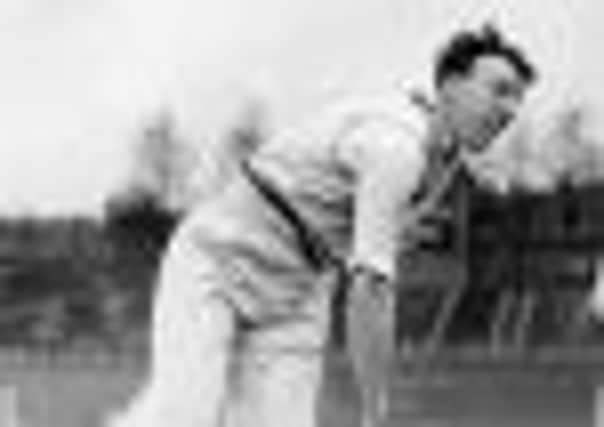Sporting Bygones: Appleyard’s part in demolishing New Zealand for the lowest score in history of Test cricket


Bob Appleyard, the former Yorkshire and England seam and spin bowler, was part of the England side that dismissed New Zealand for 26 at Auckland in 1955 – still the lowest total in Test history.
It is a remarkable record and one in which Appleyard is proud to have been involved.
Advertisement
Hide AdAdvertisement
Hide AdHe had England’s best figures of 4-7 from six overs before Len Hutton, his Yorkshire team-mate and England captain, took him off with eight wickets down.
“There can’t have been many bowlers in the game’s history who’ve been taken off after taking 4-7,” laughed Appleyard.
“It was the last match of a long tour in which we’d retained the Ashes in Australia and then gone on to New Zealand, and Len wanted his main bowlers, Frank Tyson and Brian Statham, to finish off the New Zealanders.
“So I was denied the chance to get my fifth wicket, but I didn’t mind at all because the likes of Johnny Wardle and myself were only the supporting cast to Frank and Brian.
Advertisement
Hide AdAdvertisement
Hide Ad“It was a really nice gesture on Len’s part to bring them back to finish the innings after the wonderful tour we’d all enjoyed.”
Statham duly captured the last two wickets as the New Zealanders fell victim to one of cricket’s most unwanted records.
The previous lowest Test total was 30, made on two occasions by South Africa against England.
The first instance came at Port Elizabeth in 1896 when George Lohmann returned 8-7 – including the hat-trick.
Advertisement
Hide AdAdvertisement
Hide AdThe second was at Edgbaston in 1924 – the year of Appleyard’s birth – when South Africa were routed by pace bowlers Maurice Tate and Arthur Gilligan, the latter also present in Auckland to see Appleyard and company set the new benchmark.
Appleyard, whose passion and enthusiasm for the game shows no sign of abating at the age of 87, was highly unlucky not to emulate Lohmann’s feat of achieving a hat-trick.
In fact, he could have had a hat-trick in both innings as New Zealand struggled to combat his wiles. In the first innings, Appleyard dismissed Tony MacGibbon and Ian Colquhoun with successive deliveries only for Alex Moir to keep out the hat-trick ball. Moir also survived the hat-trick delivery in the second innings, edging just short of Tom Graveney in the leg-trap after Appleyard again sent back MacGibbon and Colquhoun.
“I took two wickets in two balls on many occasions in my career, but I only once achieved a hat-trick,” added Appleyard.
Advertisement
Hide AdAdvertisement
Hide Ad“That was for Yorkshire against Gloucestershire at Sheffield in 1956 when I sent back Sam Cook, Bomber Wells and Frank McHugh.
“Fred Trueman used to joke that it was the worst hat-trick in the game’s history.
“He reckoned they were three of the worst batsmen around at the time.”
In the match at Auckland, New Zealand batted first and scored 200, John Reid top-scoring with 73 and Appleyard capturing 3-38 from 16 overs.
Advertisement
Hide AdAdvertisement
Hide AdEngland replied with 246 on a pitch made difficult by heavy rain – conditions that invariably drew the best out of Hutton, who led the way with a fine 53.
Tyson chipped in with 27 not out from No 9, an innings that helped swing the momentum England’s way.
Although they had a first innings lead of only 46, Hutton rightly predicted it would prove sufficient.
According to Wisden, “it was exactly three o’clock on a glorious summer’s day” when New Zealand began their second innings.
Advertisement
Hide AdAdvertisement
Hide AdThe almanack reported that “the pitch was dry and not particularly fast, but the ball went through at varying heights and took spin”.
New Zealand were soon in trouble and slipped to 14-4 when they lost Bert Sutcliffe, their talisman, to a chinaman from Wardle.
The dismissal opened the floodgates as Appleyard quickly removed Noel McGregor and Harry Cave.
When MacGibbon and Colquhoun followed, New Zealand were 22-8 and in total disarray.
Advertisement
Hide AdAdvertisement
Hide AdGeoff Rabone, the New Zealand captain, and Johnny Hayes fell to Statham as England sealed victory by an innings and 20 runs.
“It was one of those collapses that suddenly happens,” said Appleyard. “Everything just went for us and the edges went to hand.
“New Zealand had two very good players in John Reid and Bert Sutcliffe, but not too many others who were in that class.
“We didn’t know it was a record at the time, but it’s one that has managed to survive all these years.”